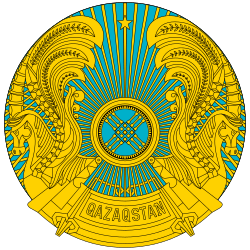Religion in Kazakhstan
According to various polls, the majority of Kazakhstan's citizens, primarily ethnic Kazakhs, identify as non-denominational Muslims[2], while others incline towards Sunni of the Hanafi school, traditionally including ethnic Kazakhs, who constitute about 63.6% of the population, as well as ethnic Uzbeks, Uighurs, and Tatars.[3][4] Less than 1% are part of the Shafi`i (primarily Chechens) and Shi'a.[4] There are a total of 2,300 mosques,[5] all of them affiliated with the "Spiritual Association of Muslims of Kazakhstan", headed by a supreme mufti.[6] The Eid al-Adha is recognized as a national holiday.[5]
Religion in Kazakhstan (2009 Census)[1]
Less than 25% of the population of Kazakhstan is Russian Orthodox, traditionally including ethnic Russians, Ukrainians and Belarusians.[4] Other Christian groups include Catholics and Protestants (Baptists, Presbyterians, Lutherans, Pentecostals, Methodists, Mennonites and Seventh-day Adventists), including restorationist Christian faiths such as Jehovah's Witnesses and Mormons.[4] There are a total of 265 registered Orthodox churches, 93 Catholic churches, and 543 Protestant churches and prayer houses.[4] Christmas, rendered in the Russian Orthodox manner according to the Julian calendar, is recognized as a national holiday in Kazakhstan.[5]
Other religious registered groups include Judaism, the Bahá'í Faith, Hinduism, Buddhism, the Church of Scientology, Christian Science, and the Unification Church.[4]
Since independence, the number of mosques and churches has increased greatly.[4] However, the population is sometimes wary of minority religious groups and groups that proselytize.[4] There were several reports of citizens filing complaints with authorities after their family members became involved with such groups.[4] Leaders of the four religious groups the government considers "traditional" – Islam, Russian Orthodoxy, Catholicism, and Judaism – reported general acceptance and tolerance that other religious groups did not always enjoy.[4]
Religious history
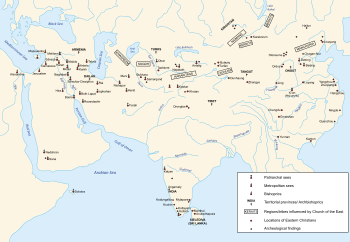
The country has historically hosted a wide variety of ethnic groups with varying religions. Intolerance to other societies has become an issue of the Kazakh culture. The foundation of an independent republic, following the disintegration of the USSR, has launched a great deal of changes in every aspect of people's lives. Religiosity of the population, as an essential part of any cultural identity, has undergone dynamic transformations as well.
Baptist Churches are often raided. This is due to the church members gathering without registering themselves, a requirement of the country. Anyone who does not register risk being raided by the police. However not only those that violate the law are treated harshly. [7]
On May 2, 2017, a court in the capital of Astana, Kazakhstan, sentenced a 61 year old husband and father of three sons, to a five-year prison sentence for performing peaceful Bible education work. Teymur Akhmedov, is a member of Jehovah's Witnesses. The court called his preaching and teaching efforts “inciting religious discord” and “advocating [religious] superiority.” In addition, the judge also imposed a three-year ban on Mr. Akhmedov’s participation in Bible education activities. Mr Akhmedov's medical issues were not considered, as he requires treatment for a bleeding tumor and has been denied the medical attention that he requires. [8]
After decades of suppressed culture, the people were feeling a great need to exhibit their ethnic identity – in part through religion. Quantitative research shows that for the first years after the establishment of the new laws, waiving any restrictions on religious beliefs and proclaiming full freedom of confessions, the country experienced a huge spike in religious activity of its citizens. Hundreds of mosques, synagogues, churches, and other religious structures were built in a matter of years. All represented religions benefited from increased number of members and facilities. Many confessions that were absent before independence made their way into the country, appealing to hundreds of people. The government supported this activity, and has done its best to provide equality among all religious organizations and their followers. In the late 1990s, however, a slight decline in religiosity occurred. The draft religion law being considered in June 2008 has raised international concern over whether there is an intention to meet general standards of freedom of religion and human rights.[9]
Faiths
Islam
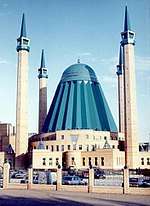
Islam is the most commonly practiced religion in Kazakhstan; it was introduced to the region during the 8th century by the Arabs.[10] Traditionally ethnic Kazakhs are Sunni Muslims who mainly follow the Hanafi school.[11] Kazakhs including other ethnic groups of Muslim background make up over 90 per cent of all Muslims.[12] The southern region of the country has the highest concentration of self-identified practicing Muslims.
Christianity
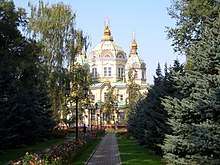
Christianity in Kazakhstan is the second most practiced religion after Islam. Most Christian citizens are Russians, and to a lesser extent Ukrainians and Belarusians, who belong to the Russian Orthodox Church. According to a 2009 national census, approximately 26% of the population of Kazakhstan identifies as Christian.[13] 1.5 percent of the population is German, most of whom follow Catholicism or Lutheranism. There are also many Presbyterians, Jehovah's Witnesses, Seventh-day Adventists, and Pentecostals.[11][14] Methodists, Mennonites, and Mormons have also registered churches with the government.[11] According to the 2009 census, there were 4,214,232 Christians in Kazakhstan.[15] "Kazakhstan is the strange core of traditionalist Catholicism," Catholic writer Ross Douthat stated in 2018.[16]
Bahá'í Faith
The Bahá'í Faith in Kazakhstan began during the policy of oppression of religion in the former Soviet Union. Before that time, Kazakhstan, as part of the Russian Empire, would have had indirect contact with the Bahá'í Faith as far back as 1847.[17] Following the entrance of pioneers the community grew to be the largest religious community after Islam and Christianity, though only a few percent of the nation.[18] By 1994 the National Spiritual Assembly of Kazakhstan was elected[19] and the community has begun to multiply its efforts across various interests. The Association of Religion Data Archives (relying on World Christian Encyclopedia) estimated some 6,000 Bahá'ís in 2005.[20]
Judaism
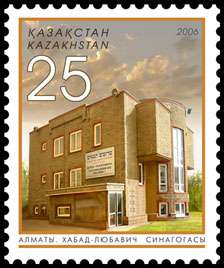
Kazakh Jews have a long history. There are approximately 12,000 to 30,000 Jews in Kazakhstan, less than 1% of the population. Most Kazakh Jews are Ashkenazi and speak Russian.[11][21]
Hinduism
Hindus in Kazakhstan are mainly of the ISKCON sect and by Diaspora Hindus from India. The Indian community in Central Asia, which comprises Kazakhstan, Uzbekistan and Turkmenistan, numbers only 2732 out of a total population of 55.5 million. It consists mainly of NRIs.
Pagan
- Slavic Neopaganism
Tengrism
Tengrism is a Central Asian religion characterized by shamanism, animism, totemism, poly- and monotheism and ancestor worship. It was the prevailing religion of the Turks, Mongols, Hungarians, Xiongnu and Huns, and the religion of the five ancient Turkic states: Göktürk Khaganate, Western Turkic Khaganate, Great Bulgaria, Bulgarian Empire and Eastern Tourkia (Khazaria). In Irk Bitig, Tengri is mentioned as Türük Tängrisi (God of Turks).
Tengrists view their existence as sustained by the eternal blue sky (Tengri), the fertile mother-earth spirit (Umay) and a ruler regarded as the holy spirit of the sky. Heaven, earth, spirits of nature and ancestors provide for every need and protect all humans. By living an upright, respectful life, a human will keep his world in balance and perfect his personal Wind Horse, or spirit. The Huns of the northern Caucasus reportedly believed in two gods: Tangri Han (or Tengri Khan), considered identical to the Persian Aspandiat and for whom horses were sacrificed, and Kuar (whose victims are struck by lightning). Tengrism is practised in Sakha, Buryatia, Tuva and Mongolia in parallel with Tibetan Buddhism and Burkhanism.
Irreligion
According to studies, over 10 years the number of those who consider themselves atheists in Kazakhstan has tripled. In 2019, the share of non-believers in Kazakhstan was 18.8% of total population, according to the vice-speaker of lower house of parliament Vladimir Bojko. Just over 75 per cent of Kazakhstanis consider themselves believers, but do not perform regular religious rites and are not involved in the activities of any religious associations.[22]
Freedom of religion and religious tolerance
Kazakhstan has a very diverse and stable religious background. However, some reported occurrences of persecution against Hare Krishnas and Jehovah's Witnesses for proselytizing have raised concern in the international community.[23][24][25]
Article 22 of the Constitution of the Republic of Kazakhstan states that "everyone has the right to a freedom of conscience.” On May 18, 2011, the President of Kazakhstan adopted a decree establishing the Agency for Religious Affairs. The mission of the Agency is to coordinate interaction between the government, religious groups and civil society in order to ensure religious freedom in Kazakhstan.[26]
In 2003 Kazakhstan established Congress of Leaders of World and Traditional Religions that aims to facilitate religious dialogue ensuring inter-religious tolerance and freedom in Kazakhstan.[27]
Religion by ethnic group
The 2009 census yielded the following results of Kazakhstan's population by religion and ethnic group.[13]
| Ethnic group | Islam | Christianity | Judaism | Buddhism | Other | Atheism | NA |
|---|---|---|---|---|---|---|---|
| Total | 70.20% | 26.32% | 0.03% | 0.09% | 0.02% | 2.82% | 0.51% |
| Kazakhs | 98.22% | 0.39% | 0.02% | 0.01% | 0.12% | 0.98% | 0.26% |
| Russians | 0.43% | 92.64% | 0.04% | 0.02% | 0.03% | 6.09% | 0.75% |
| Uzbeks | 99.05% | 0.39% | 0.01% | 0.01% | 0.02% | 0.37% | 0.16% |
| Ukrainians | 0.94% | 90.74% | 0.03% | 0.01% | 0.02% | 7.31% | 0.94% |
| Uyghurs | 98.35% | 0.51% | 0.02% | 0.01% | 0.03% | 0.61% | 0.47% |
| Tatars | 79.57% | 10.24% | 0.02% | 0.03% | 0.06% | 8.11% | 1.97% |
| Germans | 1.58% | 81.59% | 0.05% | 0.04% | 0.11% | 13.96% | 2.68% |
| Koreans | 5.24% | 49.35% | 0.21% | 11.40% | 0.14% | 28.51% | 5.16% |
| Turks | 99.13% | 0.30% | 0.01% | 0.01% | 0.02% | 0.33% | 0.21% |
| Azerbaijanis | 94.81% | 2.51% | 0.02% | 0.02% | 0.03% | 1.86% | 0.76% |
| Belarusians | 0.79% | 90.16% | 0.04% | 0.01% | 0.03% | 7.82% | 1.15% |
| Dungans | 98.93% | 0.37% | 0.01% | 0.03% | 0.04% | 0.34% | 0.28% |
| Kurds | 98.28% | 0.53% | 0.03% | 0.02% | 0.02% | 0.74% | 0.38% |
| Tajiks | 97.78% | 0.91% | 0.01% | 0.02% | 0.08% | 0.85% | 0.35% |
| Poles | 0.69% | 90.07% | 0.04% | 0.01% | 0.13% | 7.30% | 1.76% |
| Chechens | 93.69% | 2.99% | 0.02% | 0.01% | 0.05% | 2.08% | 1.16% |
| Kirghiz | 96.67% | 0.89% | 0.03% | 0.03% | 0.02% | 1.51% | 0.86% |
| Others | 34.69% | 52.32% | 0.82% | 0.91% | 0.13% | 8.44% | 2.69% |
References
- "Archived copy". Archived from the original on May 11, 2011. Retrieved July 24, 2011.CS1 maint: archived copy as title (link)
- http://www.pewforum.org/2012/08/09/the-worlds-muslims-unity-and-diversity-1-religious-affiliation/#identity
- "Итоги переписи населения Республики Казахстан 2009 года". Archived from the original on June 28, 2010. Retrieved 2010-06-01.. stat.kz. 4 February 2010.
- Kazakhstan – International Religious Freedom Report 2010 U.S. Department of State. Retrieved on 13 January 2011.
- Religious Situation Review in Kazakhstan Congress of World Religions. Retrieved on 2009-09-07.
- Islam in Kazakhstan Retrieved on 2009-09-07.
- https://www.opendoorsusa.org/take-action/pray/raids-churches-kazakhstan/
- https://www.jw.org/en/news/releases/by-region/kazakhstan/imprisons-ailing-jehovahs-witness-bans-his-worship/
- Bayram, Mushfig (2008-06-10). "KAZAKHSTAN: Restrictive draft Religion Law to reach full parliament tomorrow". Forum 18. Retrieved 2009-06-05.
- "Archived copy". Archived from the original on 2008-09-18. Retrieved 2008-05-27.CS1 maint: archived copy as title (link) The Beliefs of the Kazakhstan people
- International Religious Freedom Report 2006 Archived 2008-06-22 at the Wayback Machine U.S. Embassy in Astana, Kazakhstan
- Estimation based on Kazakh population share of 67% (Итоги 10 дней с 25 февраля по 6 марта) and 16.3 mln total population according to the preliminary results of the 2009 National Census Archived 2009-04-21 at the Wayback Machine
- "The results of the national population census in 2009". Agency of Statistics of the Republic of Kazakhstan. 12 November 2010. Archived from the original on 22 July 2011. Retrieved 13 January 2011.
- "CIA – The World Factbook – Kazakhstan". The World Factbook. CIA. 2009-05-14. Retrieved 2009-06-05.
- "Archived copy". Archived from the original on 2011-05-11. Retrieved 2011-07-24.CS1 maint: archived copy as title (link)
- Douthat, Ross (2018-02-27). "Uncommon Knowledge" (Interview). Interviewed by Peter Robinson. Retrieved 2018-04-30.
- Momen, Moojan. "Russia". Draft for "A Short Encyclopedia of the Bahá'í Faith". Bahá'í Library Online. Retrieved 2008-04-14.
- Government of Kazakhstan (2001). "Religious Groups in Kazakhstan". 2001 Census. Embassy of Kazakhstan to the USA & Canada. Archived from the original on 2006-10-31. Retrieved 2008-05-21.
- The Bahá'í Faith: 1844-1963: Information Statistical and Comparative, Including the Achievements of the Ten Year International Bahá'í Teaching & Consolidation Plan 1953-1963, Compiled by Hands of the Cause Residing in the Holy Land, pages 22 and 46.
- "Most Baha'i Nations (2005)". QuickLists > Compare Nations > Religions >. The Association of Religion Data Archives. 2005. Retrieved 2009-07-04.
- Oreck, Alden. "The Virtual Jewish History Tour – Kazakhstan". Jewish Virtual Library. Retrieved 2009-06-05.
- "People Without Religion. Number of Atheists Grows in Kazakhstan". CABAR.asia. 2019-08-27. Retrieved 2020-07-30.
- Corley, Felix (2007-04-03). "KAZAKHSTAN: Officially-inspired intolerance of religious freedom steps up". Forum 18. Retrieved 2009-06-05.
- Corley, Felix (2006-12-06). "KAZAKHSTAN: More Hare Krishna home demolitions planned?". Forum 18. Retrieved 2009-06-05.
- Palace of the Soul: Project Updates Archived 2008-03-20 at the Wayback Machine
- "Religious Affairs Agency Works to Protect Freedoms, Stop Extremist Ideologies". astanatimes.com.
- "Historic Potential of the Congress of Leaders of World and Traditional Religions". astanatimes.com.
![]()
